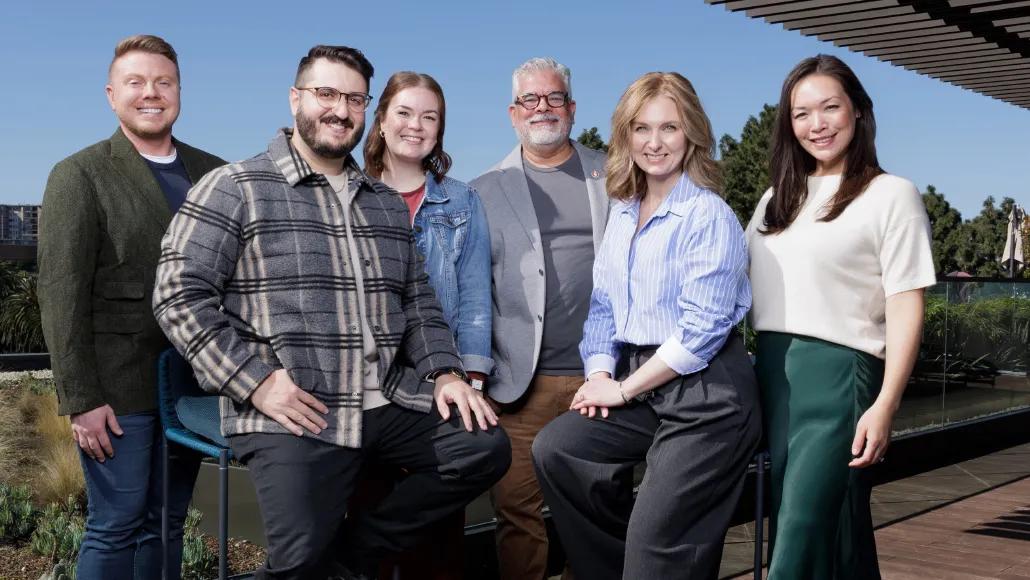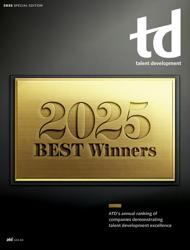TD Magazine Article
Member Benefit
Change Is a Constant
The Prometheus TD team is continuously adjusting programs so that they evolve with the company and employees’ needs.
Mon Jun 16 2025
Prometheus Real Estate Group: 2025 BEST Award Winner, #20
San Mateo, California

Continuous learning isn't just for employees at Prometheus Real Estate Group. The company's talent development team leverages continuous learning to reflect on its programs, refining and improving them to ensure Prometheans feel at home on the job.
Prometheus's staff of more than 500 manages 53 apartment properties and nearly 13,000 units across California's San Francisco Bay Area ; Portland, Oregon; and Seattle, Washington.
Evaluating each of its TD initiatives quarterly and adjusting to meet the organization's changing needs, Prometheus evolved several training programs in 2024 to make them more effective and further the company's ability to identify ideal candidates for advancement.
"Intentional focus on building our leadership pipeline from internal talent is supported by our leadership team, starting from our CEO, Jackie Safier," explains TD director Anna Post. "As Jackie says, 'Great people create great real estate. If we take time to attract, support, and retain great people, and provide opportunities for them to grow, success will follow.'"
Revamping onboarding
First, TD addressed key issues to create a more robust maintenance department, beginning with revising the onboarding process to allow more on-the-job training for promising new hires.
The recruiting team had plenty of candidates that would make a great cultural fit for Prometheus, but they lacked specific skills necessary for various maintenance roles. TD joined forces with recruiting and operations support (a floating team that fills staffing gaps) to develop the Maintenance in Training program. Through MIT, Prometheus could hire maintenance technicians with no prior experience and place them on the operations support team for onboarding and training. Once new technicians ramp up their skill levels, the company places them with a permanent maintenance team.
In roundtable discussions with maintenance workers, the TD team also discovered technicians lacked clarity about how to progress to higher-level roles. TD addressed that concern by redesigning the onboarding manual from a single role focus to a road map covering all levels.
The new manual clearly outlines the linear progression of the maintenance roles and the skill sets required for each level. Customized development plan templates complement the manual to make it even easier to put learning into action and facilitate career conversations between technicians and managers.
Re-evaluating leadership development
In 2024, Prometheus commenced a redesign of leadership competency models to align better with organizational shifts and portfolio changes. Currently, the company bases leadership roles on the number of units a manager oversees. However, Prometheus envisions leadership performing at more complex levels, regardless of the number of units in each property.
TD is working with operations leadership to define career growth by skill level. Identifying the necessary skills for each leadership level will create more growth opportunities while enabling managers to progress to senior roles without necessarily moving to a larger property.
With the goal of consistently developing emerging leaders, Prometheus established its Get Growing program to prepare high-potential individuals for management positions. The initial cohort experienced incredible success, with seven of nine participants receiving a promotion into a supervisory role within one year.
"We've learned some great lessons from the success of the program," Post says. "We took a closer look at what made a successful candidate for the program, and it became the impetus for re-evaluating our approach for the talent matrix."
For more than five years, Prometheus relied on the 9-Box model to assess performance and potential for talent review and succession planning. Using that matrix as a tool to identify candidates for Get Growing, the team realized the three-point performance rating in the 9-Box model lacked sufficient gradient. Leaders avoided placing employees in low-performance categories unless they were on disciplinary action, clustering most employees toward the middle.
To combat that, the company introduced a four-by-four matrix for talent review that encouraged leaders to distinguish between those improving and those fully meeting, but not exceeding, expectations. The four-point scale helps separate "the middle" into top and bottom performers.
Using the new matrix with more clear-cut differentiators to conduct the next talent review for maintenance technicians cut calibration time in half and enabled leaders to quickly and fairly identify candidates for the Get Growing program.
With the initial success of Get Growing and improvements to the talent matrix, Prometheus launched a new iteration of the program last year geared toward helping leasing managers prepare to become neighborhood managers over one to two years.
"We are very excited about the potential outcomes," Post states. "We can proudly say that our organization truly invests in growing our talent internally."
Modifying mentoring
Last year, the executive team tasked TD with launching a new mentoring program to build up the talent pipeline. When operations leadership expressed concerns that the program may be duplicative of other training initiatives, the TD team sought a way to increase the program's value.
Revisiting an existing informal career conversations program, TD learned many of the career coaches voluntarily stayed in contact with their coachees, naturally evolving the program beyond its original scope. Moving away from a rigid mentorship structure, TD staff began to position mentoring as an ongoing leadership practice.
The TD function developed a workshop on formal and informal mentoring opportunities, wrapping in the previous career conversation framework and career goal worksheets while encouraging mentoring relationships to progress organically.
Seeing mentoring as a valuable way to develop leadership skills, operations leaders became eager to nominate high-potential senior property managers as mentors, knowing it provided an opportunity for those managers to grow.
"By expanding two existing programs and positioning mentoring as a leadership practice, we successfully aligned the program with organizational goals while building strong buy-in from our operations leaders," Post explains. "Although we didn't introduce any new technology, our innovative approach involved reframing mentoring from a one-time event to an ongoing process."

